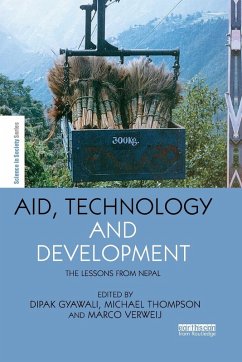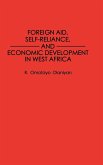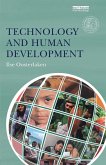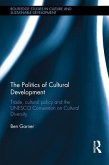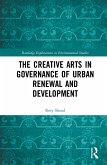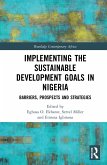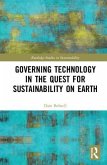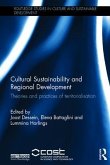Aid, Technology and Development
The Lessons from Nepal
Herausgeber: Gyawali, Dipak; Verweij, Marco; Thompson, Michael
Aid, Technology and Development
The Lessons from Nepal
Herausgeber: Gyawali, Dipak; Verweij, Marco; Thompson, Michael
- Broschiertes Buch
- Merkliste
- Auf die Merkliste
- Bewerten Bewerten
- Teilen
- Produkt teilen
- Produkterinnerung
- Produkterinnerung
This book challenges and critques human development as practiced since the end of World War II. Nepal can be viewed as a kind of laboratory for studying the effectiveness and success of global human developments, with nearly all theories and practices attempted here since 1945. As such, it constitutes a rich grounded database allowing the editors and contributors to theorize about aid, development and technology in the 20th century and beyond.
Andere Kunden interessierten sich auch für
![Foreign Aid, Self-Reliance, and Economic Development in West Africa Foreign Aid, Self-Reliance, and Economic Development in West Africa]() R. Omotayo OlaniyanForeign Aid, Self-Reliance, and Economic Development in West Africa101,99 €
R. Omotayo OlaniyanForeign Aid, Self-Reliance, and Economic Development in West Africa101,99 €![Technology and Human Development Technology and Human Development]() Ilse OosterlakenTechnology and Human Development67,99 €
Ilse OosterlakenTechnology and Human Development67,99 €![The Politics of Cultural Development The Politics of Cultural Development]() Ben GarnerThe Politics of Cultural Development209,99 €
Ben GarnerThe Politics of Cultural Development209,99 €![The Creative Arts in Governance of Urban Renewal and Development The Creative Arts in Governance of Urban Renewal and Development]() Rory ShandThe Creative Arts in Governance of Urban Renewal and Development198,99 €
Rory ShandThe Creative Arts in Governance of Urban Renewal and Development198,99 €![Implementing the Sustainable Development Goals in Nigeria Implementing the Sustainable Development Goals in Nigeria]() Implementing the Sustainable Development Goals in Nigeria198,99 €
Implementing the Sustainable Development Goals in Nigeria198,99 €![Governing Technology in the Quest for Sustainability on Earth Governing Technology in the Quest for Sustainability on Earth]() Dain BolwellGoverning Technology in the Quest for Sustainability on Earth199,99 €
Dain BolwellGoverning Technology in the Quest for Sustainability on Earth199,99 €![Cultural Sustainability and Regional Development Cultural Sustainability and Regional Development]() Cultural Sustainability and Regional Development209,99 €
Cultural Sustainability and Regional Development209,99 €-
-
-
This book challenges and critques human development as practiced since the end of World War II. Nepal can be viewed as a kind of laboratory for studying the effectiveness and success of global human developments, with nearly all theories and practices attempted here since 1945. As such, it constitutes a rich grounded database allowing the editors and contributors to theorize about aid, development and technology in the 20th century and beyond.
Hinweis: Dieser Artikel kann nur an eine deutsche Lieferadresse ausgeliefert werden.
Hinweis: Dieser Artikel kann nur an eine deutsche Lieferadresse ausgeliefert werden.
Produktdetails
- Produktdetails
- Verlag: Routledge
- Seitenzahl: 262
- Erscheinungstermin: 28. Juni 2018
- Englisch
- Abmessung: 234mm x 156mm x 14mm
- Gewicht: 404g
- ISBN-13: 9781138612563
- ISBN-10: 1138612561
- Artikelnr.: 52961495
- Herstellerkennzeichnung
- Libri GmbH
- Europaallee 1
- 36244 Bad Hersfeld
- gpsr@libri.de
- Verlag: Routledge
- Seitenzahl: 262
- Erscheinungstermin: 28. Juni 2018
- Englisch
- Abmessung: 234mm x 156mm x 14mm
- Gewicht: 404g
- ISBN-13: 9781138612563
- ISBN-10: 1138612561
- Artikelnr.: 52961495
- Herstellerkennzeichnung
- Libri GmbH
- Europaallee 1
- 36244 Bad Hersfeld
- gpsr@libri.de
Dipak Gyawali is a hydroelectric power engineer trained at Moscow Energy Institute and a political economist trained at the Energy and Resources Group of the University of California at Berkeley and was Nepal's Minister of Water Resources in 2002/2003. A Pragya (Academician) of the Nepal Academy of Science and Technology, he conducts interdisciplinary research at the interface of technology and society, mostly from the perspectives of Cultural Theory. He has been a visiting professor/research scholar as well as member of advisory boards throughout various universities and international organizations, including UN University in Yokohama, Battelle Pacific Northwest National Lab and Mekong's MPower. Currently he is on the advisory committee of UNESCO's World Water Assessment Program, Stockholm International Water Institute's Scientific Program Committee, and IDS Sussex STEPs Center' advisory board. He chairs Nepal Water Conservation Foundation as well as Inter Disciplinary Analysts. Michael Thompson has had a long association with Nepal: first as a teenage soldier in the Malayan "emergency" (where he served in the British army's Gurkha Division), then as a Himalayan mountaineer, and subsequently as an anthropologist-cum-policy analyst. Trained at University College London (B.Sc, Ph.D) and Oxford (B.Litt), he is currently a senior researcher at the International Institute for Applied Systems Analysis, a global change think-tank in Austria. There he develops and applies the concept of "plural rationality": people doing very different things and yet still behaving rationally, given their different sets of convictions as to how the world is and people are. Marco Verweij is Professor of Political Science at Jacobs University in Bremen, Germany. He holds a doctorate in social and political science from the European University Institute in Florence, Italy, and previously earned his keep at the Max Planck Institute for Research on Collective Goods in Bonn, Germany, and at the Singapore Management University. In his research, he attempts to understand how 'wicked' social and environmental problems can be resolved through the combined forces of (inter)governmental action, entrepreneurship, technological innovation, as well as civil society engagement. He also explores the possible synergies between social and political theory, brain research and the analysis of human complex systems.
Part 1: The Dharma of Development: A Conceptual Framework
Chapter 1 The Dharma of Development (Michael Thompson, Dipak Gyawali and
Marco Verweij)
Chapter 2 A Cultural Theory of How to Aid Development (Marco Verweij)
Chapter 3 The Arrested Success of Pro-Poor Initiatives in Democratic Nepal
(Bihari Krishna Shrestha)
Chapter 4 Trickle to Torrent to Irrelevance? Six Decades of Foreign Aid in
Nepal (Sudhindra Sharma)
Part 2: The Case Studies
Chapter 5 Bhattedanda Milkway: Why a Climate- and Mountain-Friendly
Technology Continues to Be Ignored (Madhukar Upadhya)
Chapter 6 Whither Electric Vehicles? (Ashok Raj Pandey)
Chapter 7 Micro and Small Hydro: Serial Leap-frogging to a Braver Nepal
(Ajoy Karki)
Chapter 8 Large Hydro: Failures in Financial Engineering (Ratna Sansar
Shrestha)
Chapter 9 Biogas: Buoyant or Bust? (Saroj Rai)
Chapter 10 Water Supply and Sanitation: Elusive Targets and Slippery Means
(Anil Pokhrel)
Chapter 11 Community Forestry: Thwarting Desertification and Facing Second
Generation Problems (Hemant Ojha)
Part 3: Beyond the Age of Aid
Chapter 12 Nepal's Experience of Foreign Aid, and How It Can Kick the Habit
(Prakash Chandra Lohani)Chapter 13 Afterword:The Lessons from Nepal (Dipak
Gyawali, Michael Thompson and Marco Verweij)
Chapter 1 The Dharma of Development (Michael Thompson, Dipak Gyawali and
Marco Verweij)
Chapter 2 A Cultural Theory of How to Aid Development (Marco Verweij)
Chapter 3 The Arrested Success of Pro-Poor Initiatives in Democratic Nepal
(Bihari Krishna Shrestha)
Chapter 4 Trickle to Torrent to Irrelevance? Six Decades of Foreign Aid in
Nepal (Sudhindra Sharma)
Part 2: The Case Studies
Chapter 5 Bhattedanda Milkway: Why a Climate- and Mountain-Friendly
Technology Continues to Be Ignored (Madhukar Upadhya)
Chapter 6 Whither Electric Vehicles? (Ashok Raj Pandey)
Chapter 7 Micro and Small Hydro: Serial Leap-frogging to a Braver Nepal
(Ajoy Karki)
Chapter 8 Large Hydro: Failures in Financial Engineering (Ratna Sansar
Shrestha)
Chapter 9 Biogas: Buoyant or Bust? (Saroj Rai)
Chapter 10 Water Supply and Sanitation: Elusive Targets and Slippery Means
(Anil Pokhrel)
Chapter 11 Community Forestry: Thwarting Desertification and Facing Second
Generation Problems (Hemant Ojha)
Part 3: Beyond the Age of Aid
Chapter 12 Nepal's Experience of Foreign Aid, and How It Can Kick the Habit
(Prakash Chandra Lohani)Chapter 13 Afterword:The Lessons from Nepal (Dipak
Gyawali, Michael Thompson and Marco Verweij)
Part 1: The Dharma of Development: A Conceptual Framework
Chapter 1 The Dharma of Development (Michael Thompson, Dipak Gyawali and
Marco Verweij)
Chapter 2 A Cultural Theory of How to Aid Development (Marco Verweij)
Chapter 3 The Arrested Success of Pro-Poor Initiatives in Democratic Nepal
(Bihari Krishna Shrestha)
Chapter 4 Trickle to Torrent to Irrelevance? Six Decades of Foreign Aid in
Nepal (Sudhindra Sharma)
Part 2: The Case Studies
Chapter 5 Bhattedanda Milkway: Why a Climate- and Mountain-Friendly
Technology Continues to Be Ignored (Madhukar Upadhya)
Chapter 6 Whither Electric Vehicles? (Ashok Raj Pandey)
Chapter 7 Micro and Small Hydro: Serial Leap-frogging to a Braver Nepal
(Ajoy Karki)
Chapter 8 Large Hydro: Failures in Financial Engineering (Ratna Sansar
Shrestha)
Chapter 9 Biogas: Buoyant or Bust? (Saroj Rai)
Chapter 10 Water Supply and Sanitation: Elusive Targets and Slippery Means
(Anil Pokhrel)
Chapter 11 Community Forestry: Thwarting Desertification and Facing Second
Generation Problems (Hemant Ojha)
Part 3: Beyond the Age of Aid
Chapter 12 Nepal's Experience of Foreign Aid, and How It Can Kick the Habit
(Prakash Chandra Lohani)Chapter 13 Afterword:The Lessons from Nepal (Dipak
Gyawali, Michael Thompson and Marco Verweij)
Chapter 1 The Dharma of Development (Michael Thompson, Dipak Gyawali and
Marco Verweij)
Chapter 2 A Cultural Theory of How to Aid Development (Marco Verweij)
Chapter 3 The Arrested Success of Pro-Poor Initiatives in Democratic Nepal
(Bihari Krishna Shrestha)
Chapter 4 Trickle to Torrent to Irrelevance? Six Decades of Foreign Aid in
Nepal (Sudhindra Sharma)
Part 2: The Case Studies
Chapter 5 Bhattedanda Milkway: Why a Climate- and Mountain-Friendly
Technology Continues to Be Ignored (Madhukar Upadhya)
Chapter 6 Whither Electric Vehicles? (Ashok Raj Pandey)
Chapter 7 Micro and Small Hydro: Serial Leap-frogging to a Braver Nepal
(Ajoy Karki)
Chapter 8 Large Hydro: Failures in Financial Engineering (Ratna Sansar
Shrestha)
Chapter 9 Biogas: Buoyant or Bust? (Saroj Rai)
Chapter 10 Water Supply and Sanitation: Elusive Targets and Slippery Means
(Anil Pokhrel)
Chapter 11 Community Forestry: Thwarting Desertification and Facing Second
Generation Problems (Hemant Ojha)
Part 3: Beyond the Age of Aid
Chapter 12 Nepal's Experience of Foreign Aid, and How It Can Kick the Habit
(Prakash Chandra Lohani)Chapter 13 Afterword:The Lessons from Nepal (Dipak
Gyawali, Michael Thompson and Marco Verweij)

